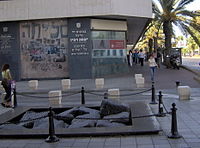on the eve of tisha b'av, i visited kikar rabin, the square where yitzkhak rabin was killed in 1995. i was last there in early 1997, and i remember the extensive graffiti

and pilgrimage-like nature of the site. having been a freshman in college at the time of his murder, i remember being especially moved - being there, in that place, where it all happened.
revisiting it yesterday was somewhat of a disappointment. there was all kinds of construction near the memorial. most of the graffiti was gone (including everything in the above picture - all that was left was one small area behind plexiglass)

and the feel was like that of a bland, fairly industrial-like, unfeeling park.

my mind went to thinking of the collage of "missing persons" notices

and candle memorials that appeared all over nyc after september 11th, especially the spontaneous memorials in washington square park (i was living in brooklyn at that time) - as public shrines often serve the need for communal reflection and hopefully healing.
but as was even being pointed out in october 2001, these spontaneous outpourings of grief were by their nature, only temporary:
The last time I walked by St. Vincent's Hospital, the ''Missing'' posters were coming apart, punished by days in the sun and the breeze. Like candles and flowers, they were entering the important degradation phase where all true symbols of grief meet their end.during the past several years, i've been especially struck by the potential smilarities between tisha b'av (with its dirge-like traditional chanting of איכה, the book of lamentations, expressing the intense emotion of the babylonian exile), and the involuntary exile of residents from new orleans after katrina, which now occured almost 3 years ago.
the stories and images from the survivors in spike lee's documentary when the levees broke can be placed side by side with the mourning of lamentations, tobit, and psalm 137, among other literature from the exilic period. these juxtapositions were first pointed out by anya kamenetz in by the waters of babylon in the village voice, and gail chalew in if i forget you, o new orleans in the forward.
last night i attended a tel-avivi tisha b'av commemoration, which included parts of a the traditional reading of eicha interspersed with songs, and brief talks, as the non-orthodox population of tel aviv struggled to make meaning from the day, while rejecting traditional perspectives that focus on the hope to rebuild the temple. one of the most interesting presentations was from a woman of ethiopian ancestry, who had assumed that the second temple was still standing until she was told otherwise after arriving in israel during the 1980s. her sense of history and mourning was very different that the assumed ashkenazi jewish narrative.
listening to chapter 5 of eicha evoked thoughts about the palestinians, and a questioning of whether roles are now reversed. have the israelis become the babylonians, with the palestinians lamenting by the waters of their refugee camps? or is there something about tisha b'av that belongs safely within the jewish narrative?
what aspects of the destruction of the temple, the death of my forebearers, the loss of a past system of judaism, do i want to mourn? how much do i allow myself to dwell in the sorrow of the past? at what point should i universalize its lessons (whatever they might be) to apply to the current tragedies of the present?
what is the meaning of the day?
No comments:
Post a Comment